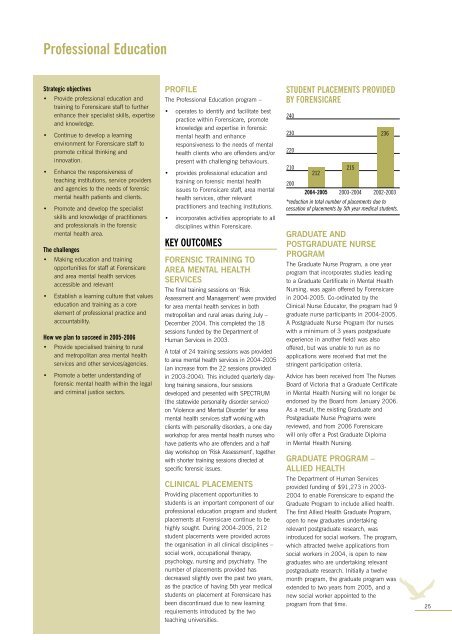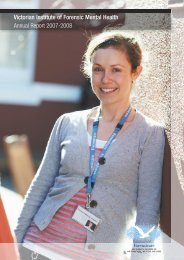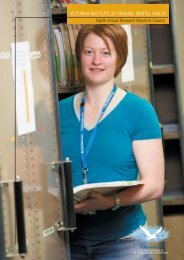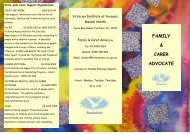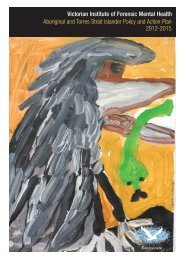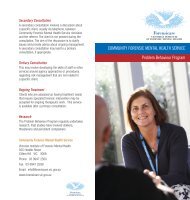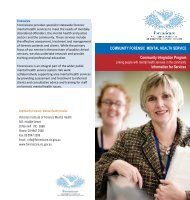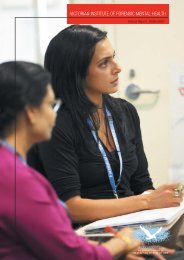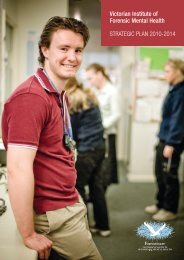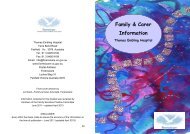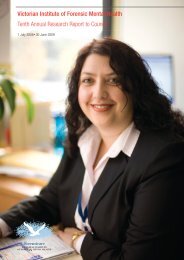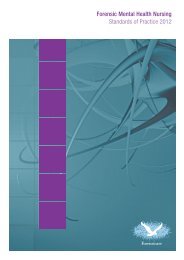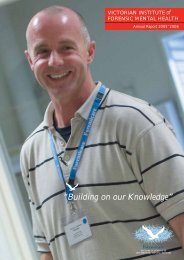Annual Report 2004-2005 - Forensicare
Annual Report 2004-2005 - Forensicare
Annual Report 2004-2005 - Forensicare
You also want an ePaper? Increase the reach of your titles
YUMPU automatically turns print PDFs into web optimized ePapers that Google loves.
Professional Education<br />
Strategic objectives<br />
• Provide professional education and<br />
training to <strong>Forensicare</strong> staff to further<br />
enhance their specialist skills, expertise<br />
and knowledge.<br />
• Continue to develop a learning<br />
environment for <strong>Forensicare</strong> staff to<br />
promote critical thinking and<br />
innovation.<br />
• Enhance the responsiveness of<br />
teaching institutions, service providers<br />
and agencies to the needs of forensic<br />
mental health patients and clients.<br />
• Promote and develop the specialist<br />
skills and knowledge of practitioners<br />
and professionals in the forensic<br />
mental health area.<br />
The challenges<br />
• Making education and training<br />
opportunities for staff at <strong>Forensicare</strong><br />
and area mental health services<br />
accessible and relevant<br />
• Establish a learning culture that values<br />
education and training as a core<br />
element of professional practice and<br />
accountability.<br />
How we plan to succeed in <strong>2005</strong>-2006<br />
• Provide specialised training to rural<br />
and metropolitan area mental health<br />
services and other services/agencies.<br />
• Promote a better understanding of<br />
forensic mental health within the legal<br />
and criminal justice sectors.<br />
PROFILE<br />
The Professional Education program –<br />
• operates to identify and facilitate best<br />
practice within <strong>Forensicare</strong>, promote<br />
knowledge and expertise in forensic<br />
mental health and enhance<br />
responsiveness to the needs of mental<br />
health clients who are offenders and/or<br />
present with challenging behaviours.<br />
• provides professional education and<br />
training on forensic mental health<br />
issues to <strong>Forensicare</strong> staff, area mental<br />
health services, other relevant<br />
practitioners and teaching institutions.<br />
• incorporates activities appropriate to all<br />
disciplines within <strong>Forensicare</strong>.<br />
KEY OUTCOMES<br />
FORENSIC TRAINING TO<br />
AREA MENTAL HEALTH<br />
SERVICES<br />
The final training sessions on ‘Risk<br />
Assessment and Management’ were provided<br />
for area mental health services in both<br />
metropolitan and rural areas during July –<br />
December <strong>2004</strong>. This completed the 18<br />
sessions funded by the Department of<br />
Human Services in 2003.<br />
A total of 24 training sessions was provided<br />
to area mental health services in <strong>2004</strong>-<strong>2005</strong><br />
(an increase from the 22 sessions provided<br />
in 2003-<strong>2004</strong>). This included quarterly daylong<br />
training sessions, four sessions<br />
developed and presented with SPECTRUM<br />
(the statewide personality disorder service)<br />
on ‘Violence and Mental Disorder’ for area<br />
mental health services staff working with<br />
clients with personality disorders, a one day<br />
workshop for area mental health nurses who<br />
have patients who are offenders and a half<br />
day workshop on ‘Risk Assessment’, together<br />
with shorter training sessions directed at<br />
specific forensic issues.<br />
CLINICAL PLACEMENTS<br />
Providing placement opportunities to<br />
students is an important component of our<br />
professional education program and student<br />
placements at <strong>Forensicare</strong> continue to be<br />
highly sought. During <strong>2004</strong>-<strong>2005</strong>, 212<br />
student placements were provided across<br />
the organisation in all clinical disciplines –<br />
social work, occupational therapy,<br />
psychology, nursing and psychiatry. The<br />
number of placements provided has<br />
decreased slightly over the past two years,<br />
as the practice of having 5th year medical<br />
students on placement at <strong>Forensicare</strong> has<br />
been discontinued due to new learning<br />
requirements introduced by the two<br />
teaching universities.<br />
STUDENT PLACEMENTS PROVIDED<br />
BY FORENSICARE<br />
240<br />
230<br />
220<br />
210<br />
200<br />
212<br />
215<br />
<strong>2004</strong>-<strong>2005</strong> 2003-<strong>2004</strong> 2002-2003<br />
*reduction in total number of placements due to<br />
cessation of placements by 5th year medical students.<br />
GRADUATE AND<br />
POSTGRADUATE NURSE<br />
PROGRAM<br />
The Graduate Nurse Program, a one year<br />
program that incorporates studies leading<br />
to a Graduate Certificate in Mental Health<br />
Nursing, was again offered by <strong>Forensicare</strong><br />
in <strong>2004</strong>-<strong>2005</strong>. Co-ordinated by the<br />
Clinical Nurse Educator, the program had 9<br />
graduate nurse participants in <strong>2004</strong>-<strong>2005</strong>.<br />
A Postgraduate Nurse Program (for nurses<br />
with a minimum of 3 years postgraduate<br />
experience in another field) was also<br />
offered, but was unable to run as no<br />
applications were received that met the<br />
stringent participation criteria.<br />
Advice has been received from The Nurses<br />
Board of Victoria that a Graduate Certificate<br />
in Mental Health Nursing will no longer be<br />
endorsed by the Board from January 2006.<br />
As a result, the existing Graduate and<br />
Postgraduate Nurse Programs were<br />
reviewed, and from 2006 <strong>Forensicare</strong><br />
will only offer a Post Graduate Diploma<br />
in Mental Health Nursing.<br />
GRADUATE PROGRAM –<br />
ALLIED HEALTH<br />
236<br />
The Department of Human Services<br />
provided funding of $91,273 in 2003-<br />
<strong>2004</strong> to enable <strong>Forensicare</strong> to expand the<br />
Graduate Program to include allied health.<br />
The first Allied Health Graduate Program,<br />
open to new graduates undertaking<br />
relevant postgraduate research, was<br />
introduced for social workers. The program,<br />
which attracted twelve applications from<br />
social workers in <strong>2004</strong>, is open to new<br />
graduates who are undertaking relevant<br />
postgraduate research. Initially a twelve<br />
month program, the graduate program was<br />
extended to two years from <strong>2005</strong>, and a<br />
new social worker appointed to the<br />
program from that time.<br />
25


